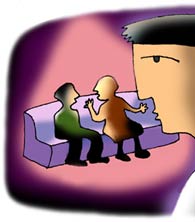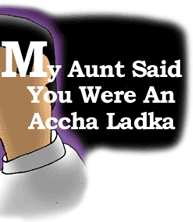The Rediff US Special/Suleman Din


As I slipped into my black sweater, I noticed my wife standing behind me,
leaning into her beige cell phone, giggling. I turned back to glance at her,
wondering if she was mocking my flabby self.
Her mother was on the phone, explaining that some friends from the same batch
as hers in Karachi would also be joining us for dinner, and she wanted to know
what I was wearing. She wanted to make sure I would make a good
impression.
"Behtii, tell him in a nice way, don't come looking sloppy," she advised her
daughter.
My stomach turned as I ran my hands down my chest, attempting to brush off
the silvery flecks of lint entwined in the sweater's fabric. My wife sweetly
explained that no matter how much I tried, only a lint brush would properly
work.
Static cling was least of my worries, though. Fears in my mind were forming
about the evening dinner with my susraal and their friends.
Growing up as a North American-confused-desi, I was keen to avoid any
South Asian social situation. Whether it was a community function, shaadi or a
house visit, I sensed an underlying code of behavior that was distinctly foreign,
but with my limited Urdu skills, difficult to comprehend.
This evening would be unavoidable, though, as I faced the tough task of getting
to know my traditionalist father-in-law. Things didn't start off too good, from my perspective, when I met him for only
the second time in my life.
After I had come in the house, my mother-in-law introduced me to him. He
brusquely shook my hand and embraced me, and walked upstairs without
saying another word.
His quick departure caught me unawares, and I sat on the couch, sinking slowly
on its velour surface.
My brother-in-law tried consoling me, explaining that if the man hadn't liked
me, he never would have embraced me. "It's hard for him to express his feelings," he said, "but he likes you. One step at
a time."
I tried to block bad thoughts out of my mind. I assumed it was another dictum
of the code, where the father is quiet and stern with the young interloper who
would take his daughter away from him.
The arrival of the other guests only multiplied my stress. All complete strangers
to me, all much older than me, yet only too happy to explain that they had come
from so far just to see me.
I sat on the couch, with a vacant smile and my arms crossed, not knowing what
to say, understanding that I was being sized up-again! Another unspoken rule,
I surmised, where one politely accepts the scrutiny of people unknown to him.
The smiling, chatty aunties sat next to me, and asked the usual questions: Where
were my parents from, where was I born, what did I do, how did I meet my
wife?
"Your Urdu accent is very good," said one auntie, "though you were raised
here. My nephews are so bad at speaking the language, it is a pity." I smiled, but in the back of my head, I gagged. I recognized her line as an old
NRI trick to test my fluency in the language. I mustn't attempt to reply in Urdu, I
thought, and dispel her assumption.
"Ji haan," I meekly said.
My father-in-law was not among my questioners, though. He sat in the far-end
of the living room with an earnest uncle, discussing family affairs and politics
over chai.
Would I ever be able to talk as freely to my father-in-law, I wondered, as the
uncle did? Was the generation gap too big to cross? For so many years, I had
never cared for the unspoken code, never bothered to understand it. My life
was in North America, my views of the world shaped in North America. Now
the old South Asian traditions were stacked in front of me, in the form of one
traditionalist man, and I couldn't help but feel lost.
The questioning continued until dinner was served. I ate my fill, sitting directly
across the dining table from my father-in-law. He ate quietly, piling the chowwel
and salaan into his roti.
My wife, resplendent in a yellow shalwar-kurta, pulled me aside.
"They love you," she said happily. "One of the aunties said that you were an
accha ladka and that you look very smart."
The stress on my head lessened a bit. I had followed my time-honored principle
at every South Asian social situation of constantly smiling and saying "ji haan,"
and it looked like it worked again. They probably told my father-in-law about
what they felt about me, I considered.
Of course, I spoke too soon; in fact, I shouldn't have spoken at all.
The discussion at the table had turned to nutrition, and my wife was quick to
point out that I was a habitual junk eater. The aunties chimed in, suggesting a
healthy diet of daal and subzi would be good.
I tried to defend myself, and stupidly attempted to do so in Urdu. I had
remembered a pun my cousin had told me about smoking: people who smoke,
die, and people who don't smoke, also die. I tried to apply this to food: people
who eat good food, die, people who don't eat good food, also die.
My attempt to translate that got as far as "Joh loog achhi cheez khatai hain, voh
maartai..."
There was a second of silence at the table, then a burst of horrendous, heaving
laughter.
"Oh my gosh, you speak just as bad as my nephews," said the auntie, waving a
napkin at her face like a fan.
My wife looked at me with pity, like you would at a lost child, and explained
that my translation didn't come out the way it was supposed to. She stroked my
chin, and said it was cute, at least I tried.
I was more concerned about her father. How hard had I tried not to look bad,
not to reveal the fact that I was a cultural illiterate? My reaction to the laughter
was to dart my eyes towards him. But he remained stony-faced, unmoved.
I blew it, I thought. I wasn't even hearing my wife at that point.
I knew ahead of time that some gift giving would end the night. We were
celebrating my brother-in-law's birthday, and also my mother-in-law's.
My wife and I had gone out shopping earlier in the day for some gifts. We gave
her mother a bracelet and her brother some new clothes from the Gap, his
favorite store. They both were touched by the gifts, and thanked us heartily. My brother
in-law gave me a big hug.
And then, my father-in-law beckoned to me, his arm outstretched.
I was stunned; I think his family was too.
Here was this old traditionalist, never given to expressing his emotions,
following that underlying South Asian code and reaching out to me.
Never mind my inability to speak fluent Urdu or my discomfort with the old
ways. It was, I realized, the same with him; he wasn't too sure about my generation's views and ways or as comfortable with English as
we are.
I went forward and lightly hugged him. Some day, I thought, we might even sit down and discuss politics and family affairs!!
Design and sketch: Uttam Ghosh
Back to top
Tell us what you think of this report